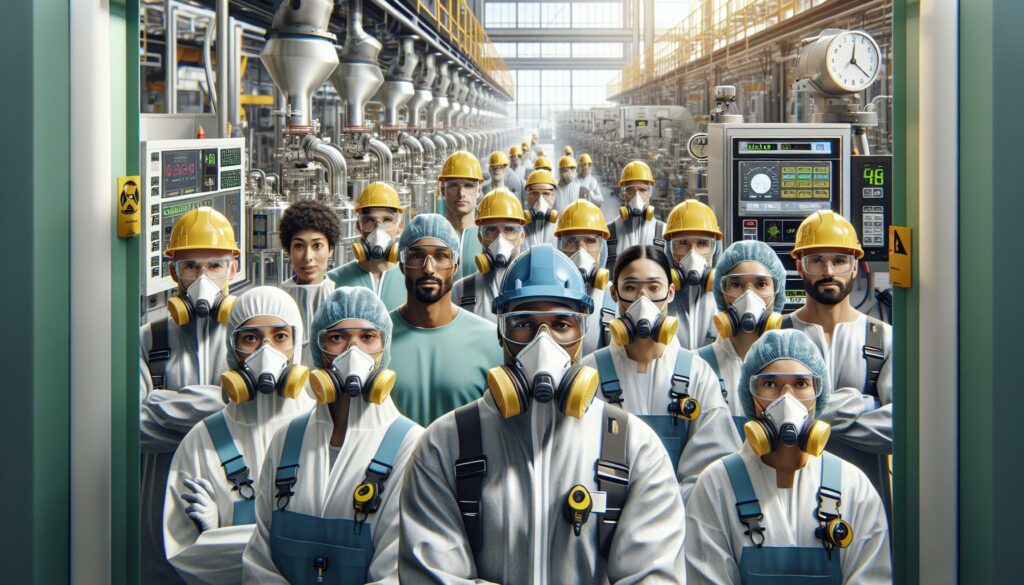I’ve always been fascinated by how industrial engineers optimize complex systems and improve efficiency in every sector. A Bachelor of Science Industrial Engineering opens doors to endless possibilities in manufacturing healthcare logistics and beyond.
This dynamic field combines engineering principles with business acumen to streamline processes reduce costs and enhance productivity. As industries evolve with technological advancements I’ve seen how industrial engineers play a crucial role in shaping the future of smart manufacturing and sustainable operations. Whether you’re passionate about data analytics supply chain management or quality control this degree program equips you with the versatile skills needed to tackle real-world challenges.
Key Takeaways
- A Bachelor of Science Industrial Engineering combines engineering principles with business concepts to optimize systems and improve efficiency across various industries.
- The program requires 128-132 credit hours, including core courses in mathematics, science, technical engineering, and business management fundamentals.
- Students develop essential technical skills in process optimization, quality control, CAD software, and simulation tools through hands-on laboratory work and internships.
- Career opportunities span multiple sectors including manufacturing, healthcare, technology, and consulting, with starting salaries ranging from $65,800 to $72,300.
- Professional advancement requires certifications like FE/PE licensure, Six Sigma Black Belt, and CQE, with senior roles offering salaries between $90,000-$150,000.
Bachelor of Science Industrial Engineering
Industrial engineering combines engineering principles with mathematical optimization to enhance systems integrating people, materials, equipment and energy. This discipline focuses on improving efficiency while maintaining quality standards across various industries.
Key Focus Areas and Principles
Industrial engineering encompasses these essential focus areas:
- Process optimization through time studies, workflow analysis and lean manufacturing techniques
- Quality control implementation using statistical methods and Six Sigma methodologies
- Supply chain management including inventory control, logistics planning and distribution networks
- Ergonomics design incorporating human factors into workplace layouts and equipment interfaces
- Operations research applying mathematical modeling to solve complex business problems
- Project management coordinating resources, timelines and deliverables for system improvements
- Safety engineering establishing protocols to prevent workplace accidents and injuries
- Manufacturing plants as production managers or process improvement specialists
- Healthcare facilities optimizing patient flow and resource allocation
- Technology companies developing automated systems and robotics solutions
- Consulting firms providing expertise in operational efficiency
- Aerospace organizations managing complex assembly operations
- Logistics companies designing distribution networks
- Financial institutions analyzing data for risk management
| Industry Sector | Average Starting Salary | Job Growth Rate (2020-2030) |
|---|---|---|
| Manufacturing | $68,500 | 14% |
| Healthcare | $65,800 | 16% |
| Technology | $72,300 | 18% |
| Consulting | $70,200 | 15% |
| Aerospace | $71,500 | 13% |
Core Curriculum Requirements
The Bachelor of Science Industrial Engineering curriculum integrates foundational mathematics, technical engineering principles, and business management concepts. The program requires completion of 128-132 credit hours across specialized courses designed to develop comprehensive industrial engineering expertise.
Mathematics and Science Foundation
Industrial engineering students complete 32 credit hours of mathematics and science coursework in the first two years. This includes:
- Calculus I, II & III with focus on differential equations and multivariable calculus
- Linear algebra incorporating matrix operations and vector spaces
- Physics covering mechanics, thermodynamics and electricity
- Chemistry fundamentals including atomic structure and chemical reactions
- Probability and statistics emphasizing data analysis and statistical process control
Technical Engineering Courses
The technical core comprises 45 credit hours of specialized industrial engineering courses:
- Operations research methods for optimization and simulation
- Manufacturing processes including CNC programming and automation
- Quality engineering with Six Sigma methodologies
- Ergonomics and human factors engineering
- Production planning and inventory control
- Facility layout and material handling systems
- Computer-aided design and manufacturing (CAD/CAM)
- Engineering economics analyzing cost estimation and financial decisions
- Project management covering scheduling and resource allocation
- Supply chain management and logistics optimization
- Operations management for process improvement
- Organizational behavior and leadership principles
- Engineering ethics and professional practice standards
| Course Category | Credit Hours | Year of Study |
|---|---|---|
| Mathematics & Science | 32 | 1-2 |
| Technical Engineering | 45 | 2-4 |
| Business Management | 18 | 3-4 |
| General Education | 33-37 | 1-4 |
Essential Technical Skills
Industrial engineers master specific technical competencies that enable them to analyze complex systems and implement data-driven solutions. Here are the key technical skill areas essential for success in industrial engineering:
Process Optimization and Analysis
Process optimization combines statistical analysis with engineering principles to enhance operational efficiency. This skill set includes:
- Applying Six Sigma methodologies to reduce process variations
- Using simulation software like Arena or FlexSim to model workflows
- Implementing lean manufacturing techniques to eliminate waste
- Creating value stream maps to identify process bottlenecks
- Utilizing operations research tools to solve complex optimization problems
Quality Control Methods
Quality control in industrial engineering focuses on maintaining product standards through systematic monitoring techniques. The core competencies include:
- Operating statistical process control (SPC) charts
- Conducting root cause analysis using Ishikawa diagrams
- Performing measurement system analysis (MSA)
- Implementing design of experiments (DOE)
- Using quality management software like Minitab
- Developing plant layouts using AutoCAD or similar CAD software
- Creating production schedules with MRP/ERP systems
- Implementing cellular manufacturing concepts
- Designing material handling systems
- Optimizing inventory management systems through JIT principles
Hands-On Learning Components
Industrial engineering students gain practical experience through immersive learning opportunities that bridge theoretical knowledge with real-world applications. These components integrate technical skills development with industry-standard practices.
Laboratory Work
Industrial engineering laboratories provide hands-on experience with advanced manufacturing equipment, simulation software, and quality control tools. Students practice with:
- Computer-Aided Design (CAD) software for product design optimization
- 3D printing facilities for rapid prototyping applications
- Motion study equipment for ergonomic assessments
- Statistical process control tools like Minitab for quality analysis
- Robotics workstations for automation programming
- Material testing instruments for strength analysis
- Virtual reality systems for plant layout simulation
- Time study equipment for workflow optimization
- 12-16 week placements at manufacturing facilities, consulting firms, or technology companies
- Direct involvement in process improvement projects
- Exposure to lean manufacturing implementation
- Quality control system monitoring
- Supply chain optimization assignments
- Production scheduling coordination
- Safety protocol development
- Cost reduction initiatives
| Internship Component | Average Duration | Typical Project Scope |
|---|---|---|
| Manufacturing | 14 weeks | 2-3 projects |
| Process Analysis | 12 weeks | 1-2 major systems |
| Quality Control | 16 weeks | 3-4 product lines |
| Supply Chain | 13 weeks | Regional networks |
Professional Certifications and Licensing
Industrial engineering graduates enhance their professional credentials through state licensure and specialized certifications, validating their expertise in specific areas of practice.
FE and PE Exam Requirements
The Fundamentals of Engineering (FE) exam serves as the first step toward Professional Engineer (PE) licensure. The FE Industrial exam consists of 110 questions covering 13 knowledge areas including mathematics, engineering economics, probability statistics. After passing the FE exam and gaining 4 years of engineering experience under a licensed PE, engineers become eligible for the PE Industrial and Systems exam. The PE exam comprises 85 questions testing advanced concepts in manufacturing operations industrial safety project management.
| Exam Component | Questions | Duration | Pass Rate (2022) |
|---|---|---|---|
| FE Industrial | 110 | 6 hours | 72% |
| PE Industrial | 85 | 8.5 hours | 65% |
- Certified Quality Engineer (CQE) from ASQ focusing on quality systems development statistical methods
- Six Sigma Black Belt certification demonstrating process improvement leadership capabilities
- Certified Supply Chain Professional (CSCP) from APICS validating end-to-end supply chain knowledge
- Project Management Professional (PMP) certification proving project leadership competencies
- Certified Manufacturing Engineer (CMfgE) from SME showing advanced manufacturing expertise
| Certification | Organization | Experience Required | Exam Cost |
|---|---|---|---|
| CQE | ASQ | 8 years | $498 |
| Six Sigma BB | Various | 3 years | $2,195 |
| CSCP | APICS | 3 years | $995 |
| PMP | PMI | 3 years | $555 |
| CMfgE | SME | 8 years | $750 |
Career Growth and Advancement
Industrial engineering professionals advance through a structured career path marked by increasing responsibilities and specialization opportunities. The progression typically moves from entry-level positions to senior roles with comprehensive system oversight.
Entry-Level Positions
Entry-level industrial engineers start in positions focused on specific process improvements or system components. Common entry-level roles include:
- Process Engineer: Analyzes manufacturing workflows to identify inefficiencies
- Quality Engineer: Monitors product specifications and implements quality control measures
- Production Coordinator: Manages daily operations and scheduling in manufacturing facilities
- Systems Analyst: Evaluates existing systems and recommends technological improvements
Starting salaries for these positions range from $65,000 to $75,000, with advancement potential after 3-5 years of experience.
Senior Engineering Roles
Senior industrial engineers lead complex projects and manage teams across multiple departments. Advanced positions include:
- Manufacturing Operations Manager: $95,000-$120,000
- Senior Process Improvement Engineer: $90,000-$115,000
- Supply Chain Director: $120,000-$150,000
- Industrial Engineering Manager: $110,000-$140,000
Key responsibilities at senior levels:
- Direct cross-functional teams of 10-15 engineers
- Manage annual budgets exceeding $5 million
- Implement enterprise-wide efficiency initiatives
- Lead strategic planning for operational excellence
- Oversee multiple facility optimization projects
- 8-10 years of progressive experience
- Professional Engineering (PE) license
- Advanced certifications (Six Sigma Black Belt CQE)
- Project management expertise
- Leadership of 3-5 major improvement initiatives
Graduate Degree in Engineering
A Bachelor of Science Industrial Engineering opens doors to endless possibilities in today’s dynamic business landscape. I’ve seen how this degree equips graduates with a unique blend of technical and managerial skills that are invaluable across industries.
From optimizing manufacturing processes to revolutionizing healthcare systems I believe industrial engineers will continue to play a crucial role in shaping our future. The combination of robust technical training professional certifications and practical experience creates well-rounded professionals who are ready to tackle complex challenges.
Whether you’re passionate about technology driven by data or interested in improving human-centered systems this degree provides the foundation for a rewarding career with significant growth potential.



